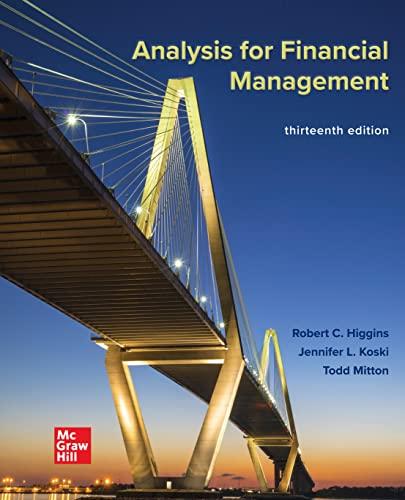Answered step by step
Verified Expert Solution
Question
1 Approved Answer
Utah Enterprises is considering buying a vacant lot that sells for $ 1 . 2 million. If the property is purchased, the company's plan is
Utah Enterprises is considering buying a vacant lot that sells for $ million. If the property is purchased, the company's plan is to spend another $ million
today to build a hotel on the property. The aftertax cash flows from the hotel will depend critically on whether the state imposes a tourism tax in this
year's legislative session. If the tax is imposed, the hotel is expected to produce aftertax cash inflows of $ at the end of each of the next years,
versus $ if the tax is not imposed. The project has a cost of capital. Assume at the outset that the company does not have the option to delay
the project. Use decisiontree analysis to answer the following questions.
a What is the project's expected NPV if the tax is imposed? Do not round intermediate calculations. Enter your answer in millions. For example, an
answer of $ million should be entered as not Round your answer to three decimal places. Negative value, if any, should be
indicated by a minus sign.
$
million
b What is the project's expected NPV if the tax is not imposed? Do not round intermediate calculations. Enter your answer in millions. For example,
an answer of $ million should be entered as not Round your answer to three decimal places. Negative value, if any, should
be indicated by a minus sign.
$
million
c Given that there is a chance that the tax will be imposed, what is the project's expected NPV if the company proceed with it today? Do not
round intermediate calculations. Enter your answer in millions. For example, an answer of $ million should be entered as not
Round your answer to three decimal places. Negative value, if any, should be indicated by a minus sign.
$
million
d Although the company does not have an option to delay construction, it does have the option to abandon the project if the tax is imposed. If it
abandons the project, it would complete the sale of the property year from now at an expected price of $ million. If the company decides to
abandon the project, it won't receive any cash inflows from it except for the selling price. If all cash flows are discounted at would the
existence of this abandonment option affect the company's decision to proceed with the project today?
e Assume there is no option to abandon or delay the project but that the company has an option to purchase an adjacent property in year at a
price of $ million. If the tourism tax is imposed, then the present value of future development opportunities for this property as of is only
$so it wouldn't make sense to purchase the property for $ million However, if the tax is not imposed, then the present value of the
future opportunities from developing the property would be $ million as of Thus, under this scenario it would make sense to purchase the
property for $ million. Given that cash flows are discounted at and that there's a chance the tax will be imposed, how much would
the company pay today for the option to purchase this property year from now for $ million? Do not round intermediate calculations. Enter
your answer in millions. For example, an answer of $ million should be entered as not Round your answer to three decimal
places. Negative value, if any, should be indicated by a minus sign.
$
million

Step by Step Solution
There are 3 Steps involved in it
Step: 1

Get Instant Access to Expert-Tailored Solutions
See step-by-step solutions with expert insights and AI powered tools for academic success
Step: 2

Step: 3

Ace Your Homework with AI
Get the answers you need in no time with our AI-driven, step-by-step assistance
Get Started


